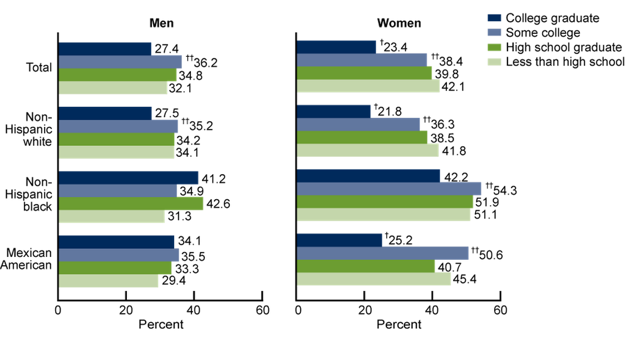Many studies have shown that people tend to gain weight after marriage. There’s something about having a built-in Netflix buddy and pizza splitter that causes extra pounds to gradually deposit themselves and never leave. What’s more, people who don’t graduate from college are more likely to be obese.
Obesity Prevalence by Education Level
 CDC
CDCBut a new study published Thursday in the Journal of Health and Social Behavior suggests that it’s the order in which people go about college and marriage that matters. The study authors found that people who got married before completing college were 50 percent more likely to later become obese than people who earned their degrees first.
The study relies on the health data of nearly 14,000 people from the National Longitudinal Study of Adolescent Health, which has been tracking the same group of middle- and high-schoolers since 1995. When the subjects were last interviewed, in 2008, they were an average of 28 years old. The University of Michigan sociologist Richard Allen Miech and his coauthors examined the subjects’ BMIs at various points, and they also looked at when they attended college and got married. (The subjects were considered “obese” if their BMIs were above 30.)
Among those with a college degree, 17 percent of those who tied the knot after they graduated were obese, compared with 24 percent of those who got married first. There was a smaller, but still significant, effect found for the timing of children: People who had kids before college were more likely to be obese.
Importantly, the authors controlled for the participants’ parents’ socioeconomic status and for their BMI before they reached college age. In other words, these individuals weren’t more likely to be obese to begin with: The marriage timing definitely had something to do with the weight gain.
But what was it, exactly?
“People who earn a college degree before getting married are more likely to have developed problem-solving skills.”The study didn’t aim to find a reason, but the researchers proffer one theory, which is that college gives us critical-thinking skills that helps manage weight under changing circumstances. (That might help explain why college-educated people tend to be thinner in general.)
People who get married before they acquire those skills have already transitioned into their adult social roles—and might have already adopted all the unhealthy eating habits of married life. College-educated spouses also make more money, so they can afford the Pilates classes and kale chips that help guard against obesity.
“People who earn a college degree before getting married are more likely to have developed problem-solving skills that allow them to overcome obstacles that may prevent them from exercising and eating healthy as they adjust to married life,” Miech said in a statement. “On the other hand, our research suggests that people who earn a college degree after marrying may have established exercise and diet habits that are more difficult to change later.”
It’s hard to know exactly how to harness this finding to help society—people do (and should!) get married whenever they want to, after all. But it is a powerful illustration of just how difficult it is to stay healthy in today’s Doritos-Locos-Tacos world. You literally need a college degree, it seems, to avoid the minefield of food temptations that crop up once you settle into domesticity.
http://www.theatlantic.com/health/archive/2015/05/obesity-college-degree-married-order/394250/

